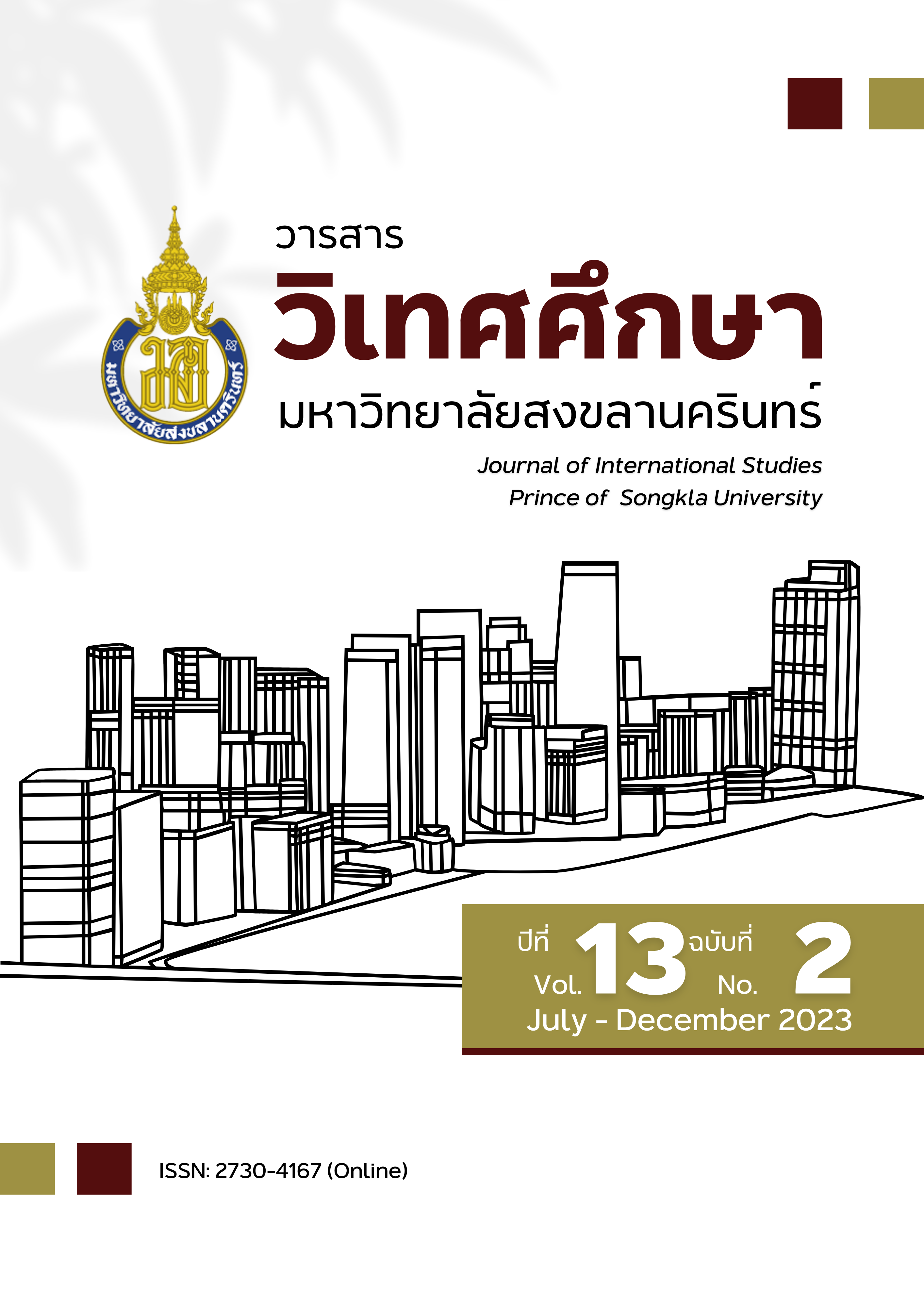Jeju and Phuket Islands in Transitions: A Comparative Study on the Government’s Development Policies and Their Impacts on the Two Islands
Main Article Content
Abstract
This research aims to explore: 1) how the government’s development policies in recent decades have impacted the South Korean Island of Jeju and Thailand’s Phuket Island; 2) the state of the government decentralization in both countries which can either facilitate or hinder such developments; and 3) the role of civil society in promoting balanced developments on the two islands. The study employs a qualitative approach that applies the Most Similar System Design inspired by John Stuart Mill and is based on the premise that these three factors, namely government policies, decentralization, and civil society, are inextricably linked and necessary for the two countries to achieve their sustainable development goals.
The research result shows that the government’s development policies of both South Korea and Thailand have paradoxically similarly impacted these two islands. While many policies aim to promote sustainable development, their policies promoting growth in tourism and investment have caused several environmental problems and made locals' lives more volatile. Differences between the two countries are perceived in the aspects of their state of government decentralization and the role of civil society. As for government decentralization, the status of “autonomous island” for Jeju appears more promising in giving locals the right to choose their sustainable path, even though with several limitations. On the other hand, Thailand’s unfinished decentralization has kept Phuket heavily reliant on central initiatives, resulting in weak and ineffective local administrations whose authorities are derived from local citizens. In terms of the role of civil society, the civil society in Jeju is strong and well-connected, whereas, in Phuket, such qualities need to be promoted to enhance citizens’ roles in cooperating with the government and adhering to policy direction that benefits all parties and sustains good quality of life for islanders.
Article Details

This work is licensed under a Creative Commons Attribution-NonCommercial-NoDerivatives 4.0 International License.
Statements and opinions expressed in articles herein are those of the authors and do not necessarily reflect the position of the editors or publisher.
Article, information, text, image, etc. which are published in Journal of International Studies, belong to Journal of International Studies. If anybody or any organization would like to use part or whole of them, they must receive written permission from Journal of International Studies before usage.
References
กลุ่มงานยุทธศาสตร์และข้อมูลเพื่อการพัฒนาจังหวัด. (2562). แผนพัฒนาจังหวัดภูเก็ต พ.ศ. 2561 - 2565 ฉบับทบทวนปีงบประมาณ พ.ศ. 2564. จังหวัดภูเก็ต.
ณัฐชัย ไชยารัตน์. (2550). แนวทางการพัฒนาพื้นที่เพื่อการท่องเที่ยวบนพื้นที่เสี่ยงภัยธรรมชาติธรณีพิบัติสึนามิ: กรณีศึกษา หาดกมลา ตําบลกมลา อําเภอกะทู้ จังหวัดภูเก็ต. Journal of Architectural/Planning Research and Studies, 5(2), 55-76.
เทศบาลนครภูเก็ต. (2560, 29 มีนาคม). เทศบาลนครภูเก็ตขอเชิญร่วมงานรำลึก ๑๐๔ ปี พระยารัษฎานุประดิษฐ์ฯ. https://www.phuketcity.go.th/news/detail/2230
มูลนิธิสถาบันสิ่งแวดล้อมไทย. (2557). ภาคธุรกิจ เมืองภูเก็ต. https://www.tei.or.th/thaicityclimate/public/research-40.pdf
ศิรินทร์ สังข์ทอง และอารีย์ฏา ถิรสัตยาพิทักษ์. (2562). การมีส่วนร่วมของประชาชนในการจัดการท่องเที่ยวอย่างยั่งยืน : กรณีศึกษา ณ ย่านเมืองเก่าภูเก็ต. วารสารวิชาการการท่องเที่ยวไทยนานาชาติ, 15(1), 1-21.
สถาบันไทยพัฒน์. (2558). การประชุมสุดยอดแห่งสหัสวรรษ. มูลนิธิบูรณะชนบทแห่งประเทศไทย ในพระบรมราชูปถัมภ์. https://www.thaicsr.com/2015/09/millennium-summit.html
สถาบันไทยพัฒน์. (2558). การประชุม Earth Summit 1992 (Rio). มูลนิธิบูรณะชนบทแห่งประเทศไทย ในพระบรมราชูปถัมภ์. https://www.thaicsr.com/2015/09/earth-summit-1992-rio.html
สันติ บางอ้อ. (21 มิถุนายน 2456). สภาพัฒน์กับการพัฒนาประเทศไทย: การพัฒนาที่ยั่งยืนของไทย ตอนที่ 2. โพสต์ทูเดย์. https://www.nesdc.go.th/images/content/data03_2-46.pdf
สำนักงานคณะกรรมการพัฒนาการเศรษฐกิจและสังคมแห่งชาติ (2550). แนวทางการพัฒนาขีดความสามารถในการแข่งขันของการท่องเที่ยวจังหวัดภูเก็ตอย่างยั่งยืน พ.ศ. 2550 - 2554. https://www.nesdc.go.th/article_attach/Book-cyan%20220851.pdf
สำนักงานปลัดกระทรวงเกษตรและสหกรณ์. (2563). ข้อมูลพื้นฐานจังหวัดภูเก็ต. https://www.opsmoac.go.th/phuket-dwl-files-422791791802
สํานักงานสถิติจังหวัดภูเก็ต. (2563). การสํารวจภาวะการทํางานของประชากร จังหวัดภูเก็ต ไตรมาสที่ 4 : ตุลาคม – ธันวาคม 2562. http://phuket.nso.go.th/images/new/inpkt_stat/labor_q4_62.pdf
สำนักงานสภาพัฒนาการเศรษฐกิจและสังคมแห่งชาติ. (2564). ผลิตภัณฑ์ภาคและจังหวัดแบบปริมาณลูกโซ่ฉบับพ.ศ. 2562. https://www.nesdc.go.th/ewt_dl_link.php?nid=11539
สำนักงานสภาพัฒนาการเศรษฐกิจและสังคมแห่งชาติ. (2564). ร่างกรอบแผนพัฒนาภาค พ.ศ. 2566 – 2570. https://www.nesdc.go.th/ewt_dl_link.php?nid=11684&filename=index
Achadthaya Chuenniran. (2020, 22 July). Phuket in big push to revive tourism. Bangkok Post. https://www.bangkokpost.com/business/1955371/phuket-in-big-push-to-revive-tourism
C9 Hotelworks. (2020, May). Phuket Economic Review. https://www.c9hotelworks.com/wp-content/uploads/2020/05/phuket-economic-overview-2020-05.pdf
Directorate-General for International Cooperation and Development European Commission (2016). Supporting decentralisation, local governance, and local development through a territorial approach. Publications Office of the European Union. https://europa.eu/capacity4dev/file/32190/download?token=KDvjKUTr
FOCUS Asia Pacific. (2022, April 1). South Korea: 99.6% of tourists in Jeju in 2021 were locals. https://focusgn.com/asia-pacific/south-korea-99-6-of-tourists-in-jeju-in-2021-were-locals
Glass, Lisa-Maria & Newig, J. (2019). Governance for achieving the Sustainable Development Goals: How important are participation, policy coherence, reflexivity, adaptation and democratic institutions? Earth System Governance Journal, 2. https://www.sciencedirect.com/science/article/pii/S2589811619300308
Invest KOREA. (2020). Primary Industry. Jeju. https://www.investkorea.org/jj-en/cntnts/i-1502/web.do
Jang, Hanbyeol & Thomas, Kimberley. (2021). On Being Loved to Death: The Tourism, Black Pig and Groundwater Nexus on Jeju Island, South Korea. Global Water Forum. https://globalwaterforum.org/2021/10/01/on-being-loved-to-death-the-tourism-black-pig-and-groundwater-nexus-on-jeju-island-south-korea/
JSSGP. (2017). Modified 2nd Comprehensive Plan Jeju Free International City. Jeju Special Self-Governing Province.
Kim, Seon-Pil. (2020). Mainland development policy in an autonomous subnational island jurisdiction: spatial development and economic dependence in Jeju, South Korea. Island Studies Journal, 15(1), 169-184.
Ko, Ki-bong, Kang, Young-hoon and Hwang, Kyung-soo. (2020). Implications of Hometown Love Donation (Hometown Taxation) System to Jeju Island. World Environment and Island Studies, 10(3), 111-121. http://islandstudies.net/weis/weis_2020v10/v10n3-2.pdf
Mercado, R., Páez, A., Scott, D. M., Newbold, B. & Kanaroglou, P. (2007). Transport policy in aging societies: An international comparison and implications for Canada. The Open Transportation Journal, 1, p. 1-13.
Open Development Thailand. (9 กรกฏาคม 2561). เป้าหมายการพัฒนาอย่างยั่งยืน. https://thailand.opendevelopmentmekong.net/th/topics/sustainable-development-goals/#ref-1854-14
Yamada, K. (2017, 19 March). Jeju Island goes green as Chinese tourists go elsewhere. Nikkei. https://asia.nikkei.com/Business/Jeju-Island-goes-green-as-Chinese-tourists-go-elsewhere
박소희. (2021, November 30). 제주특별법, 기괴하고 아이러니한 법률...아예 없애자. 제주투데이: http://www.ijejutoday.com/news/articleView.html?idxno=227265


